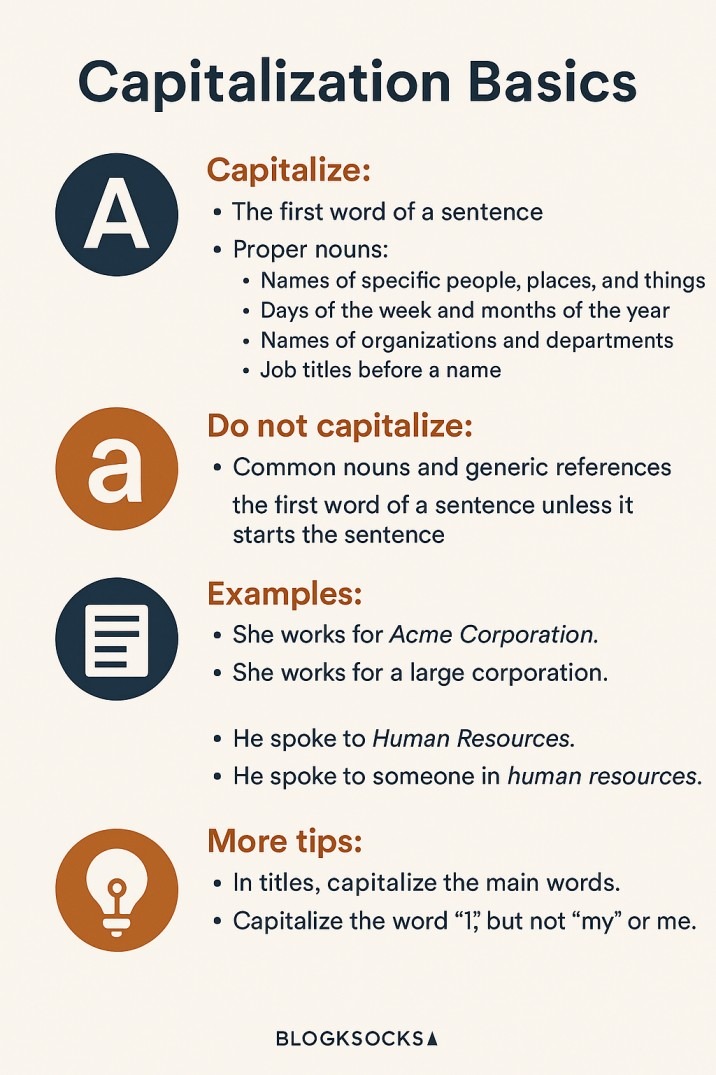Language is a living, evolving system, but grammar remains one of its most essential—and often misunderstood—pillars. When it comes to professional terminology, especially in the business world, capitalization can cause a surprising amount of confusion. One phrase that repeatedly triggers grammatical debate is “Human Resources.” So, let’s unpack the rules and settle the question once and for all: Is Human Resources capitalized or not?
The short answer is: it depends. But of course, grammar rarely leaves us with such a simplistic resolution. There are stylistic nuances, contextual variations, and usage scenarios that dictate whether “Human Resources” deserves those capital letters—or whether it should quietly remain lowercase. By the end of this article, you’ll not only know the right answer, but you’ll understand why the rules are what they are.
Understanding Capitalization Basics

Before we dive into the specifics of whether Human Resources should be capitalized, it’s worth reviewing the basic grammar rules around capitalization. In English, we capitalize proper nouns—names of specific people, places, organizations, departments, and job titles when they refer to a specific entity. We typically do not capitalize common nouns or general terms unless they begin a sentence.
For instance, we capitalize “Marketing Department” if referring to a specific department within a company but use lowercase in more general references, like “we’re hiring for several positions in marketing.”
Applying this logic helps clarify the central question: Is Human Resources capitalized? The answer hinges on how the phrase is being used in a sentence.
When Human Resources Is a Proper Noun
Let’s say you’re referencing a department within a specific company. In this case, “Human Resources” acts as a proper noun. Here, capitalization is appropriate.
Example: “Please submit your documents to the Human Resources Department by Friday.”
In this sentence, “Human Resources” functions as a distinct, named entity within an organization. Thus, capitalization is warranted. You’re not referring to human resources in the abstract or general sense—you’re pointing to a particular department with a formal name. This is one of the clearest cases where answering Is Human Resources capitalized becomes a definitive “yes.”
The same applies if you shorten the phrase and refer to the department simply as “Human Resources.”
Example: “I’ve scheduled an interview with Human Resources next week.”
Again, “Human Resources” here serves as a placeholder for the department’s name, not a generic concept. That distinction matters enormously.
Lowercase in General Use
Capitalization rules shift depending on how a term is being used in a sentence—and “human resources” is no exception. One of the most misunderstood applications of this phrase appears when it’s used in a broader, more conceptual way. So let’s turn the lens around and examine what happens when “Human Resources” is not tied to a department.
Human Resources as a Field of Study
Imagine you’re discussing human resources as an academic subject or an area of professional knowledge. In this instance, “human resources” is not a name or a title; it’s a general reference to a discipline, much like psychology, finance, or engineering. In grammatical terms, this makes it a common noun.
Example: “Understanding human resources is essential for managing employee relations effectively.”
There’s no reference here to a specific team within a company. It’s not a department that processes payroll or handles employee grievances—it’s a body of knowledge, a professional domain. And in such cases, the rule is clear: do not capitalize.
Why Context Matters
Many writers instinctively capitalize “human resources” out of habit or because the term feels important. And while its importance in business operations is undisputed, importance alone doesn’t qualify a word for capitalization. Prestige, relevance, or frequency of use does not transform a common noun into a proper noun. Grammar follows logic—not social hierarchy.
Common Pitfall: Overcapitalization
This is where confusion often sneaks in. People tend to overcapitalize terms like “marketing,” “product management,” and “human resources” simply because they’re used so often in professional contexts. This practice is especially common in resumes, business blogs, and casual internal emails. But unless the term is referring to a formal, named entity—like “the Human Resources Department”—it should remain lowercase.
Incorrect: “I’m interested in working in Human Resources.”
Correct: “I’m interested in working in human resources.”
Functional Clarity Over Aesthetic Preference
The core of grammar is clarity, not decoration. And while capital letters might appear to emphasize importance, they actually signal specificity. When asking Is Human Resources capitalized in a generic context, the answer should always rely on function, not form. If you’re not naming a specific department or referring to a defined role within a company structure, lowercase is the correct choice.
This distinction may seem subtle, but it shapes the precision and professionalism of your writing. Recognizing when “human resources” is a concept and not a department allows you to apply the grammar rule consistently and correctly.
Final Note on Style Consistency
Even if your organization adopts a more lenient or stylized approach in internal communication, your external-facing writing—emails, reports, articles—should adhere to standard grammar conventions. Style consistency builds trust and reinforces attention to detail.
So once more, in the realm of general use: Is Human Resources capitalized? No—and that’s by design.
What Style Guides Say
If you’ve ever toggled between Associated Press (AP), Chicago Manual of Style, or APA guidelines, you’ve probably noticed they don’t always agree. The question Is Human Resources capitalized gets answered differently depending on your chosen authority.
AP Style, for example, advises capitalizing department names only when they are formal, proper names. So, “the Human Resources Department” is capitalized, but “he works in human resources” remains lowercase.
The Chicago Manual of Style largely agrees but often emphasizes consistency over dogma. If your document treats “Finance Department” and “Legal Team” as capitalized terms, “Human Resources” should be treated similarly when used in parallel structure.
Academic writing under APA guidelines also follows this trend. It capitalizes official department names but not fields of study or general disciplines. So in your thesis, “Human Resources Department at XYZ Corp” is capitalized, while “I am studying human resources” is not.
Ultimately, is Human Resources capitalized remains a question with an answer that is context-sensitive and style-guide dependent.
Capitalization in Resumes and Cover Letters

Job seekers often grapple with capitalization rules, unsure whether to capitalize every instance of “Human Resources” on a resume or cover letter. And with good reason: documents like these demand both professionalism and polish. So let’s explore this practical setting.
When mentioning your work experience within a specific department, yes, you should capitalize.
Example: “Collaborated with the Human Resources team to develop onboarding protocols.”
However, if you’re simply listing your skills or referring to the field, keep it lowercase.
Example: “Strong background in recruiting, employee relations, and human resources management.”
This rule also applies when writing about your career objective.
Correct: “Seeking a leadership role in human resources at a forward-thinking tech company.”
Misuse in these contexts is one of the most common red flags in professional writing. A grammatically polished application reinforces credibility—and mastering questions like Is Human Resources capitalized can make all the difference.
Internal Documentation and Business Writing
Inside companies, internal documents often blur grammatical precision for stylistic branding. You might see capitalization used more liberally—especially in employee handbooks, memos, and internal portals.
A company might write, “Please contact Human Resources for more information,” regardless of whether it aligns with AP or Chicago rules. In this case, capitalization often acts as an internal standard rather than grammatical necessity.
That said, maintaining consistency is key. If a company chooses to capitalize “Human Resources,” they should do so consistently across all internal and external communication.
So when a colleague asks, Is Human Resources capitalized?, the honest answer might be: “What does our style guide say?”
Legal and Regulatory Documents
Legal documents bring another dimension to the capitalization debate. In contracts, policies, and official notices, you’ll frequently find “Human Resources” capitalized as a defined term. Once introduced as such—e.g., “hereinafter referred to as Human Resources”—it must be capitalized throughout the document to maintain legal consistency.
So in legal writing, the question Is Human Resources capitalized becomes less about grammar and more about the conventions of legal drafting.
The takeaway here is to identify the document type before deciding on capitalization. Formality, function, and audience all contribute to the right choice.
Email Etiquette and Everyday Use
Business communication—particularly email—is where grammatical rules often slide the most. People are quick to write “I’ll ask human resources” or “Let me check with HR,” without thinking much about whether it should be capitalized.
In most cases, emails are informal enough to allow flexibility, but clarity is still important. When referencing the department, capitalize:
Example: “I’ll forward this to Human Resources for review.”
If you’re discussing the field or function, lowercase:
Example: “I’ve worked in human resources for over a decade.”
Even in everyday writing, being intentional with your grammar enhances your message. The seemingly small question—Is Human Resources capitalized—becomes a subtle signal of your attention to detail.
SEO, Blogging, and Online Content
Capitalization decisions aren’t just about grammar—they also influence visibility, authority, and readability online. In the world of content writing, where style and substance must coexist, many creators ask: Is Human Resources capitalized in digital content?
The answer, as with most grammar questions, lies in intention and context. But here, the stakes are higher. We’re not just choosing between uppercase and lowercase—we’re making decisions that shape tone, structure, and how search engines interpret content.
Headline Capitalization in Blog Posts
Let’s begin with the obvious: titles and headers. In blog titles, capitalization follows headline-style formatting. That means key nouns, verbs, adjectives, and proper names are capitalized for readability and emphasis. This is why the headline of this article is written as:
“Grammar Rules Explained: Is Human Resources Capitalized or Not?”
In this case, “Human Resources” is capitalized not necessarily because it’s a proper noun, but because it’s a critical component of the title—and headline capitalization rules demand it. It’s a stylistic norm that enhances readability and professionalism. So, if you’re writing blog headlines, meta titles, or social media snippets, go ahead and capitalize “Human Resources” when it appears as part of the formal title.
Body Copy: Function Over Flash
However, once you move past the title and into the body of your blog post, newsletter, or website copy, it’s time to switch gears. Now, grammar rules take precedence over style. Whether you’re writing about a field or a department, the answer to Is Human Resources capitalized depends entirely on context.
If you’re referring to “human resources” as a professional discipline, you should not capitalize it.
Example: “Many startups lack a dedicated human resources strategy in their early growth stages.”
But when the term clearly refers to a department, office, or formal entity, capitalize it.
Example: “We’ve forwarded the complaint to the Human Resources Department for resolution.”
Digital writing, despite its creative flexibility, still benefits from grammatical precision. Clear, grammatically correct text improves trust with your readers and increases the chances of being featured in search snippets.
SEO Implications: What Search Engines “See”
Capitalization doesn’t directly affect SEO rankings—but consistency does impact readability, clarity, and user experience. Search engines like Google analyze keyword usage, semantic relationships, and natural phrasing when determining how to rank content.
Overcapitalizing terms like “Human Resources” when referring to general concepts can confuse both readers and crawlers. It disrupts the natural flow of language and may reduce engagement, especially when paired with overly formal or robotic copy.
By writing in a way that reflects natural usage—knowing when to capitalize and when not to—you signal linguistic authenticity. That, in turn, can boost time on page, decrease bounce rates, and improve user trust—all of which support your SEO goals.
So while the phrase Is Human Resources capitalized might not affect a keyword’s ranking weight, the way you present and structure content absolutely shapes how it performs.
Writing for Skimmability and Style
Online readers are scanners. They jump from heading to heading, skimming bullet points, quotes, and bolded phrases. Capitalization plays a subtle but powerful role here, signaling importance and helping guide the eye.
So yes, capitalize “Human Resources” in headings, subheadings, and callouts—if they reference a department. But when discussing the function, remain faithful to lowercase.
Example:
✔️ Header: “How Human Resources Can Improve Retention”
✔️ Body: “Most leaders overlook the impact of human resources in employee well-being strategies.”
The balance lies in blending SEO-smart copy with grammatically correct writing. It’s about being intentional with your choices—knowing when you’re writing to inform, when you’re writing to rank, and how to do both at once.
Final Thoughts: The Power of Precision
Grammar isn’t just for academics or editors. It’s for job seekers, business professionals, content creators, and anyone who wants their writing to reflect authority and care. When you understand when and why to capitalize “Human Resources,” you enhance your communication with accuracy and polish.
So, is Human Resources capitalized? Sometimes yes, sometimes no. And that’s not a cop-out—it’s a reflection of English grammar’s beautiful complexity. It’s your job as the writer to determine function, context, and clarity. Make it a deliberate choice, not a default one.
Let the phrase serve its purpose in your sentence, and capitalize only when it’s grammatically or stylistically justified. Because ultimately, writing well isn’t just about following rules. It’s about knowing when and why they matter.
Andrea Balint is a writer and researcher focused on human behavior, workplace psychology, and personal growth. Through her work at CareersMomentum, she explores how mindset, leadership, and emotional intelligence shape modern careers. With a background in communication and HR development, she transforms complex ideas into practical insights that help readers build clarity, confidence, and professional purpose.
